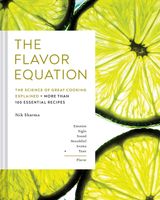Advertisement
Glutamate
Appears in
By Nik Sharma
Published 2020
Glutamate is the salt form of the amino acid glutamic acid, discovered in the seaweed kombu. When a salt of glutamate is dissolved in water, it splits into two parts: the cation sodium [Na+] and its anion or “free glutamate” [Glutamate -]. Glutamic acid by itself tastes sour, but free glutamate is what’s responsible for the savory taste in food. Glutamate is also present in proteins, but because it is attached to other amino acids in the peptide chains and not free, we can’t taste this glutamate. Glutamate is not easily broken down by heat; this stability is valuable for cooking purposes.


